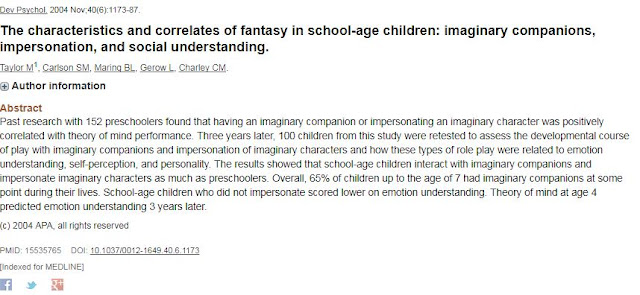kidsonscreen.co.nz/research/
Youth Media Alliance (Canada)
look for Australia and Britains, too
look up Rachel Mann's thesis online to look for reference list
Questions to answer regarding my project: from Kathryn
Can you put more of the narrative/concept with the puppets etc. at the front of your question
Imagination Warehouse- what is it? How does it relate to your question?
Why these characters?
How do these characters reflect children's issues and problems.
Why this aesthetic?
What age group is this for?
https://scholar.google.co.nz/scholar?cites=3999557817773906180&as_sdt=2005&sciodt=0,5&hl=en
http://www.tandfonline.com/doi/abs/10.2752/089279396787001400?journalCode=rfan20
https://www.babble.com/toddler/imaginary-friends-early-child-development-imagination/
Research imaginary friends in children's television
look for current citations of these articles
Imaginary friends help kids learn article news-medical.net
According psychologist, Dr. Evan Kidd at Melbourne's La Trobe University the phenomenon of the imaginary friend is really misunderstood and people think it is rare and a concern but past studies have shown that around 65% of children aged between three and nine, had imaginary friends and the characters, rather than due to some internal malaise, appear to be an essential component of normal development. children with imaginary friends are better at learning to communicate than other children because they have a lot of practice at inventing interactions with their friends, which helps them improve their conversational skills.
Dr. Kidd has established in his research that the benefits of imaginary companions are long lasting - a study of university students showed that those who recalled having an imaginary companion in childhood were more creative, more achievement oriented, and more emotionally responsive than students who didn't have one.
Dr. Evan Kidd at Sydney TEDX
from LaTrobe University in Melbourne
26 May, 2012
imaginary friends, personified objects like teddy bears with names. most famous is tiger hobbes from Calvin and Hobbes
derives from play. "Theory of Mind' says people's behavior driven by their internal mental states.
Imaginary friends and real-world consequences: parasocial relationships | Jennifer Barnes | TEDxOU
Adults need more imaginary friends | Andrew Roblyer | TEDxTAMU
https://www.ncbi.nlm.nih.gov/pubmed/15535765

role play with imaginary companion involves imagining characteristics and perspective of another individual. preschool girls more like to have imaginary friend where boys more likely to impersonate imaginary character. children who create IF more sociable and less shy, more creative, participate in more family activities, show more positive affect in their play with other children. socially competent andcreative adolescents with good coping skills were particularly likely to refer to imaginary companions in their diaries. (2)
majority of IF played with by older children are inisible, whereas half of younger children are based on props such as special toys. (13)
look at research behind how children adapt from being in families to larger environments like schools
why do children have imaginary friends and why are they important?
No comments:
Post a Comment